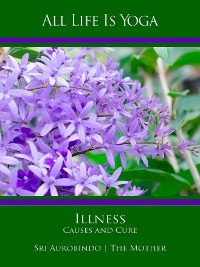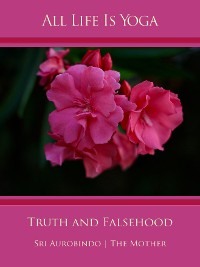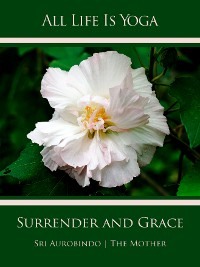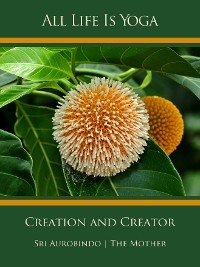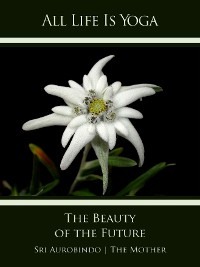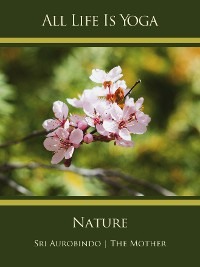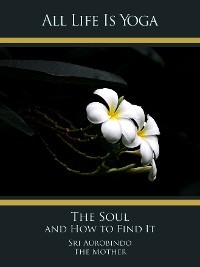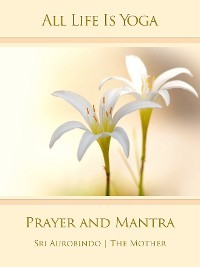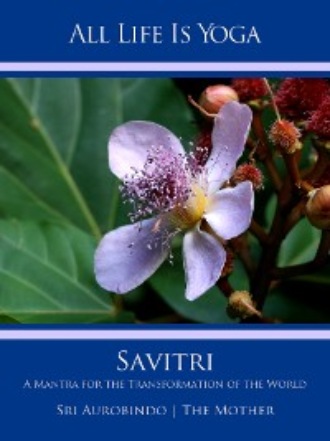
Полная версия
All Life Is Yoga: Savitri
*
Sound has a power in the material world
Words of the Mother
Sweet Mother, there’s a flower you have named “The Creative Word”.
Yes.
What does that mean?
It is the word which creates.
There are all kinds of old traditions, old Hindu traditions, old Chaldean traditions in which the Divine, in the form of the Creator, that is, in His aspect as Creator, pronounces a word which has the power to create. So it is this... And it is the origin of the mantra. The mantra is the spoken word which has a creative power. An invocation is made and there is an answer to the invocation; or one makes a prayer and the prayer is granted. This is the Word, the Word which, in its sound... it is not only the idea, it is in the sound that there’s a power of creation. It is the origin, you see, of the mantra.
In Indian mythology the creator God is Brahma, and I think that it was precisely his power which has been symbolised by this flower, “The Creative Word”. And when one is in contact with it, the words spoken have a power of evocation or creation or formation or transformation; the words... sound always has a power; it has much more power than men think. It may be a good power and it may be a bad power. It creates vibrations which have an undeniable effect. It is not so much the idea as the sound; the idea too has its own power, but in its own domain – whereas the sound has a power in the material world.
I think I have explained this to you once; I told you, for example, that words spoken casually, usually without any reflection and without attaching any importance to them, can be used to do something very good. I think I spoke to you about “Bonjour”, “Good Day”, didn’t I? When people meet and say “Bonjour”, they do so mechanically and without thinking. But if you put a will into it, an aspiration to indeed wish someone a good day, well, there is a way of saying “Good Day” which is very effective, much more effective than if simply meeting someone you thought: “Ah! I hope he has a good day”, without saying anything. If with this hope in your thought you say to him in a certain way, “Good Day”, you make it more concrete and more effective.
It’s the same thing, by the way, with curses, or when one gets angry and says bad things to people. This can do them as much harm – more harm sometimes – than if you were to give them a slap. With very sensitive people it can put their stomach out of order or give them palpitation, because you put into it an evil force which has a power of destruction.
It is not at all ineffective to speak. Naturally it depends a great deal on each one’s inner power. People who have no strength and no consciousness can’t do very much – unless they employ material means. But to the extent that you are strong, especially when you have a powerful vital, you must have a great control on what you say, otherwise you can do much harm. Without wanting to, without knowing it; through ignorance.
*
Making the power of the word effective
Words of the Mother
It seems unnecessary to draw your attention to the quantity of useless words that are uttered each day; this evil is well known to all, although very few people think of remedying it.
But there are many other words which are spoken needlessly. That is to say, in the course of the day, we often have the opportunity of expressing a helpful wish by pronouncing one word or another, provided that we know how to put the appropriate thought behind the words.
But too often we lose this opportunity of drawing a beneficial mental atmosphere around the people we know and thus of truly helping them. It would be very useful to remedy this neglect.
To do this, we must refuse to allow our minds to remain in that state of vague and passive imprecision which is almost constant in most people.
To cure ourselves progressively of this somnolence, we can, when pronouncing a word, force ourselves to reflect upon its exact meaning, its true import, in order to make it fully effective.
*
The power of words comes from three different sources
Words of the Mother
In this regard, we can say that the active power of words comes from three different causes.
The first two lie in the word itself, which has become a battery of forces. The third lies in the fact of living integrally the deep thought expressed by the word when we pronounce it.
Naturally, if these three causes of effectiveness are combined, the power of the word is considerably enhanced.
1) There are certain words whose resonance in the physical world is the perfect vibratory materialisation of the more subtle vibration produced by the thought in its own domain. If we examine closely this similarity between the vibrations of thought and sound, we can discover the limited number of root syllables which express the most general ideas, and which are to be found in most spoken languages with an almost identical meaning. (This origin of language should not be confused with the origin of written languages, which are of an altogether different nature and correspond to different needs.)
2) There are other words which have been repeated in certain circumstances for hundreds of years and which are instinct with the mental forces of all those who have pronounced them. They are true batteries of energy.
3) Finally, there are words which assume an immediate value when they are pronounced, as a result of the living thought of the one who pronounces them.
To illustrate what I have just said with an example, here is a very powerful word, for it can combine the qualities of all three categories: it is the Sanskrit word “AUM”.
It is used in India to express the divine Immanence. There, it is associated with every meditation, every contemplation, every yogic practice.
More than any other sound, this sound “AUM” gives rise to a feeling of peace, of serenity, of eternity.
Moreover, this word is instinct with the mental forces which for centuries all those who have used it have accumulated around the idea that it expresses; and, for Hindus especially, it has the true power of bringing one into contact with the divine Essence it evokes.
And as Orientals have a religious mind and the habit of concentration, few pronounce this word without putting into it the conviction that is needed to make it fully effective.
In China, a similar effect is obtained with a word of identical meaning and somewhat similar sound, the word “TAO”.
Our western languages are less expressive; in their present form, they are too far removed from the root language which gave birth to them. But we can always animate a word by the power of our living and active thought.
Besides, there are formulas which we could profitably add to all those in common use.
These formulas were used in certain ancient schools of initiation. They served as greetings, and in the mouth of one who knew how to think them, they had a very special power of action. The disciples, the neophytes who were taking their first steps on the path, were greeted: “May the peace of equilibrium be with you.”
All those who by their constant and progressive inner and outer attitude had shown their deep and lasting goodwill, were greeted: “May the highest good be yours.”
And in certain instructors manifesting especially high forces, this word was endowed with the power of transmitting true gifts, for example, the gift of healing.
* * *
1 Ananda, in the language of Indian spiritual experience, is the essential delight which the Infinite feels in itself and in its creation. By the infinite Self’s Ananda all exists, for the Self’s Ananda all was made.
Chapter 2
Poetic Vision and the Mantra
Words of Sri Aurobindo
Vision is the characteristic power of the poet, as is discriminative thought the essential gift of the philosopher and analytic observation the natural genius of the scientist. The Kavi1 was in the idea of the ancients the seer and revealer of truth, and though we have wandered far enough from that ideal to demand from him only the pleasure of the ear and the amusement of the aesthetic faculty, still all great poetry instinctively preserves something of that higher turn of its own aim and significance. Poetry, in fact, being Art, must attempt to make us see, and since it is to the inner senses that it has to address itself, – for the ear is its only physical gate of entry and even there its real appeal is to an inner hearing, – and since its object is to make us live within ourselves what the poet has embodied in his verse, it is an inner sight which he opens in us, and this inner sight must have been intense in him before he can awaken it in us.
Therefore the greatest poets have been always those who have had a large and powerful interpretative and intuitive vision of Nature and life and man and whose poetry has arisen out of that in a supreme revelatory utterance of it. ... Sight is the essential poetic gift. The archetypal poet in a world of original ideas is, we may say, a Soul that sees in itself intimately this world and all the others and God and Nature and the life of beings and sets flowing from its centre a surge of creative rhythm and word-images which become the expressive body of the vision. The great poets are those who repeat in some measure this ideal creation, kavayah satyasrutah, seers of the poetic truth and hearers of its word.
*
The poet-seer sees differently, thinks in another way, voices himself in quite another manner than the philosopher or the prophet. The prophet announces the Truth as the Word, the Law or the command of the Eternal, he is the giver of the message; the poet shows us Truth in its power of beauty, in its symbol or image, or reveals it to us in the workings of Nature or in the workings of life, and when he has done that, his whole work is done; he need not be its explicit spokesman or its official messenger. The philosopher’s business is to discriminate Truth and put its parts and aspects into intellectual relation with each other; the poet’s is to seize and embody aspects of Truth in their living relations, or rather – for that is too philosophical a language – to see her features and, excited by the vision, create in the beauty of her image.
*
...it is well to insist that the native power of poetry is in its sight, not in its intellectual thought-matter, and its safety is in adhering to this native principle of vision; its conception, its thought, its emotion, its presentation, its structure must rise out of that or else rise into it before it takes its finished form. The poetic vision of things is not a criticism of life, not an intellectual or philosophic view of it, but a soul-view, a seizing by the inner sense. The Mantra too is not in its substance or its form a poetic enunciation of philosophic verities, but a rhythmic revelation or intuition arising out of the soul’s sight of God and Nature and itself and of the world and of the inner truth – occult to the outward eye – of all that peoples it, the secrets of their life and being.
*
...one poet may seem to excel in the concrete presentation of things and falter or be less sure in his grasp of the purely subjective, while another may move freely in the more subjective worlds and be less at home in the concrete; and both may be poets of a high order. But when we look closer, we see that just as a certain objectivity is necessary to make poetry live and the thing seen stand out before our eyes, so on the other hand even the most objective presentation starts from an inner view and subjective process of creation or at least a personal interpretation and transmutation of the thing seen. The poet really creates out of himself and not out of what he sees outwardly: that outward seeing only serves to excite the inner vision to its work. Otherwise his work would be a mechanical construction and putting together, not a living creation.
*
From our present point of view we may say that the poet may do as he pleases in all that is not the essential matter. Thought-matter may be prominent in his work or life-substance predominate. He may proceed by sheer force of presentation or by direct power of interpretation. He may make this world his text, or wander into regions beyond, or soar straight into the pure empyrean of the infinite. To arrive at the Mantra he may start from the colour of a rose, or the power or beauty of a character, or the splendour of an action, or go away from all these into his own secret soul and its most hidden movements. The one thing needful is that he should be able to go beyond the word or image he uses or the form of the thing he sees, not be limited by them, but get into the light of that which they have the power to reveal and flood them with it until they overflow with its suggestions or seem even to lose themselves and disappear into the revelation and the apocalypse. At the highest he himself disappears into sight; the personality of the seer is lost in the eternity of the vision, and the Spirit of all seems alone to be there speaking out sovereignly its own secrets.
*
...it is not sufficient for poetry to attain high intensities of word and rhythm; it must have, to fill them, an answering intensity of vision and always new and more and more uplifted or inward ranges of experience. And this does not depend only on the individual power of vision of the poet, but on the mind of his age and country, its level of thought and experience, the adequacy of its symbols, the depth of its spiritual attainment. A lesser poet in a greater age may give us occasionally things which exceed in this kind the work of less favoured immortals. The religious poetry of the later Indian tongues has for us fervours of poetic revelation which in the great classics are absent, even though no mediaeval poet can rank in power with Valmiki and Kalidasa. The modern literatures of Europe commonly fall short of the Greek perfection of harmony and form, but they give us what the greatest Greek poets had not and could not have. And in our own days a poet of secondary power in his moments of inspiration can get to a vision far more satisfying to the deepest soul within us than Shakespeare’s or Dante’s. Greatest of all is the promise of the age that is coming, if the race fulfils its highest and largest opening possibilities and does not founder in a vitalistic bog or remain tied in the materialistic paddock; for it will be an age in which all the worlds are beginning to withdraw their screens from man’s gaze and invite his experience, and he will be near to the revelation of the Spirit of which they are, as we choose, the obscuring veils, the significant forms and symbols or else the transparent raiment. It is as yet uncertain to which of these consummations destiny is leading us.
* * *
1 The Sanskrit word for poet. In classical Sanskrit it is applied to any maker of verse or even of prose, but in the Vedic it meant the poet-seer who saw the Truth and found in a subtle truth-hearing the inspired word of his vision.
Chapter 3
The Poetry of the Future
Words of Sri Aurobindo
The poetry of the future has to solve, if the suggestions I have made are sound, a problem new to the art of poetic speech, an utterance of the deepest soul of man and of the universal spirit in things, not only with another and a more complete vision, but in the very inmost language of the self-experience of the soul and the sight of the spiritual mind. The attempt to speak in poetry the inmost things of the spirit or to use a psychical and spiritual seeing other than that of the more outward imagination and intelligence has indeed been made before, but for the most part and except in rare moments of an unusually inspired speech it has used some kind of figure or symbol more than a direct language of inmost experience; or else, where it has used such a language, it has been within the limited province of a purely inward experience as in the lofty philosophic and spiritual poetry of the Upanishads, the expression of a peculiar psychic feeling of Nature common in far eastern poets or the poetic setting of mystic states or of an especial religious emotion and experience of which we have a few examples in Europe and many in the literature of western Asia and India. It is a different and much larger creative and interpretative movement that we now see in its first stages, an expansion of the inner way of vision to outer no less than to inner things, to all that is subjective to us and all that is objective, a seeing by a closer identity in the self of man with the self of things and life and Nature and of all that meets him in the universe. The poet has to find the language of these identities, and even symbol and figure, when brought in to assist the more direct utterance, must be used in a different fashion, less as a veil, more as a real correspondence.
The first condition of the complete emergence of this new poetic inspiration and this vaster and deeper significance of poetic speech must be the completion of an as yet only initial spiritualised turn of our general human feeling and intelligence. At present the human mind is occupied in passing the borders of two kingdoms. It is emerging out of a period of active and mostly materialistic intellectualism towards a primary intuitive seeking to which the straining of the intellect after truth has been brought in the very drive of its own impulse by a sort of slipping over unexpected borders. There is therefore an uncertain groping in many directions some of which are only valuable as a transitional effort and, if they could be the end and final movement, might land us only in a brilliant corruption and decadence. There is a vitalistic intuitivism sometimes taking a more subjective, sometimes a more objective form, that lingers amid dubious lights on the border and cannot get through its own rather thick and often violent lustres and colours to a finer and truer spiritual vision. There is an emotional and sensational psychical intuitivism half emerging from and half entangled in the vitalistic motive that has often a strange beauty and brilliance, sometimes stained with morbid hues, sometimes floating in a vague mist, sometimes – and this is a common tendency – strained to an exaggeration of half vital, half psychic motive. There is a purer and more delicate psychic intuition with a spiritual issue, that which has been brought by the Irish poets into English literature. The poetry of Whitman and his successors has been that of life, but of life broadened, raised and illumined by a strong intellectual intuition of the self of man and the large soul of humanity. And at the subtlest elevation of all that has yet been reached stands or rather wings and floats in a high intermediate region the poetry of Tagore, not in the complete spiritual light, but amid an air shot with its seekings and glimpses, a sight and cadence found in a psycho-spiritual heaven of subtle and delicate soul experience transmuting the earth tones by the touch of its radiance. The wide success and appeal of his poetry is indeed one of the most significant signs of the tendency of the mind of the age. At the same time one feels that none of these things are at all the whole of what we are seeking or the definite outcome and issue. That can only be assured when a supreme light of the spirit, a perfect joy and satisfaction of the subtlety and complexity of a finer psychic experience and a wide strength and amplitude of the life soul sure of the earth and open to the heavens have met, found each other and fused together in the sovereign unity of some great poetic discovery and utterance.
It is possible that it may be rather in Eastern languages and by the genius of Eastern poets that there will come the first discovery of this perfection: the East has always had in its temperament a greater constant nearness to the spiritual and psychic sight and experience and it is only a more perfect turning of this sight on the whole life of man to accept and illuminate that is needed for the realisation of that for which we are still waiting. On the other hand the West has this advantage that though it is only now emerging not so much into the spiritual light as into an outer half-lit circle and though it is hampered by an excessive outward, intellectual and vital pressure, it has at present a more widely ranging thought and a more questing and active eye, and if these once take the right direction, the expression is not so much encircled by past spiritual forms and traditions. It is in any case the shock upon each other of the oriental and occidental mentalities, on the one side the large spiritual mind and inward eye turned upon self and eternal realities, on the other the free inquiry of thought and the courage of the life energy assailing the earth and its problems that is creating the future and must be the parent of the poetry of the future. The whole of life and of the world and Nature seen, fathomed, accepted, but seen in the light of man’s deepest spirit, fathomed by the fathoming of the self of man and the large self of the universe, accepted in the sense of its inmost and not only its more outward truth, the discovery of the divine reality within it and of man’s own divine possibilities, – this is the delivering vision for which our minds are seeking and it is this vision of which the future poetry must find the inspiring aesthetic form and the revealing language.
*
The world is making itself anew under a great spiritual pressure, the old things are passing away and the new things ready to come into being, and it may be that some of the old nations that have been the leaders of the past and the old literatures that have been hitherto the chosen vehicles of strong poetic creation may prove incapable of holding the greater breath of the new spirit and be condemned to fall into decadence. It may be that we shall have to look for the future creation to new poetical literatures that are not yet born or are yet in their youth and first making or, though they have done something in the past, have still to reach their greatest voice and compass. A language passes through its cycle and grows aged and decays by many maladies: it stagnates perhaps by the attachment of its life to a past tradition and mould of excellence from which it cannot get away without danger to its principle of existence or a straining and breaking of its possibilities and a highly coloured decadence; or, exhausted in its creative vigour, it passes into that attractive but dangerous phase of art for art’s sake which makes of poetry no longer a high and fine outpouring of the soul and the life but a hedonistic indulgence and dilettantism of the intelligence. These and other signs of age are not absent from the greater European literary tongues, and at such a stage it becomes a difficult and a critical experiment to attempt at once a transformation of spirit and of the inner cast of poetic language. There is yet in the present ferment and travail a compelling force of new potentiality, a saving element in the power that is at the root of the call to change, the power of the spirit ever strong to transmute life and mind and make all young again, and once this magical force can be accepted in its completeness and provided there is no long-continued floundering among perverted inspirations or half motives, the old literatures may enter rejuvenated into a new creative cycle.
*
It is this spiritual realisation that the future poetry has to help forward by giving to it its eye of sight, its shape of aesthetic beauty, its revealing tongue and it is this greatening of life that it has to make its substance.
It is in effect a larger cosmic vision, a realising of the godhead in the world and in man, of his divine possibilities as well as of the greatness of the power that manifests in what he is, a spiritualised uplifting of his thought and feeling and sense and action, a more developed psychic mind and heart, a truer and a deeper insight into his nature and the meaning of the world, a calling of diviner potentialities and more spiritual values into the intention and structure of his life that is the call upon humanity, the prospect offered to it by the slowly unfolding and now more clearly disclosed Self of the universe. The nations that most include and make real these things in their life and culture are the nations of the coming dawn and the poets of whatever tongue and race who most completely see with this vision and speak with the inspiration of its utterance are those who shall be the creators of the poetry of the future.


